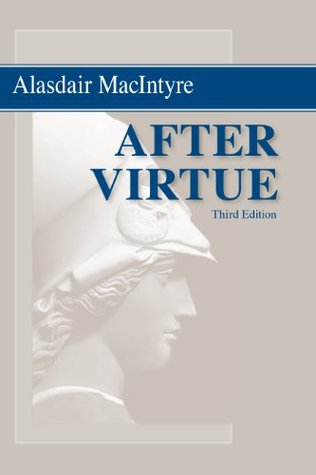More on this book
Community
Kindle Notes & Highlights
Liberal political societies are characteristically committed to denying any place for a determinate conception of the human good in their public discourse, let alone allowing that their common life should be grounded in such a conception. On the dominant liberal view, government is to be neutral as between rival conceptions of the human good, yet in fact what liberalism promotes is a kind of institutional order that is inimical to the construction and sustaining of the types of communal relationship required for the best kind of human life.
This critique of liberalism should not be interpreted as a sign of any sympathy on my part for contemporary conservatism. That conservatism is in too many ways a mirror image of the liberalism that it professedly opposes. Its commitment to a way of life structured by a free market economy is a commitment to an individualism as corrosive as that of liberalism. And, where liberalism by permissive legal enactments has tried to use the power of the modern state to transform social relationships, conservatism by prohibitive legal enactments now tries to use that same power for its own coercive
...more
The hypothesis which I wish to advance is that in the actual world which we inhabit the language of morality is in the same state of grave disorder as the language of natural science in the imaginary world which I described. What we possess, if this view is true, are the fragments of a conceptual scheme, parts which now lack those contexts from which their significance derived. We possess indeed simulacra of morality, we continue to use many of the key expressions. But we have—very largely, if not entirely—lost our comprehension, both theoretical and practical, or morality.
Emotivism is the doctrine that all evaluative judgments and more specifically all moral judgments are nothing but expressions of preference, expressions of attitude or feeling, insofar as they are moral or evaluative in character.
Characters specified thus must not be confused with social roles in general. For they are a very special type of social role which places a certain kind of moral constraint on the personality of those who inhabit them in a way in which many other social roles do not. I choose the word ‘character’ for them precisely because of the way it links dramatic and moral associations. Many modern occupational roles—that of a dentist or that of a garbage collector, for example—are not characters in the way that that of a bureaucratic manager is; many modern status roles—that of a retired member of the
...more
When the Catholic mass becomes a genre available for concert performance by Protestants, when we listen to the scripture because of what Bach wrote rather than because of what St. Matthew wrote, then sacred texts are being preserved in a form in which the traditional links with belief have been broken, even in some measure for those who still count themselves believers. It is not of course that there is no link with belief; you cannot simply detach the music of Bach or even of Handel from the Christian religion. But a traditional distinction between the religious and the aesthetic has been
...more
Kierkegaard would have said, and surely rightly, that any attitude whose absence can be discovered in a sudden flash while riding a bicycle is only an aesthetic reaction and that such experience has to be irrelevant to the commitment which genuine marriage involves, to the authority of the moral precepts which define marriage. But now whence does the ethical derive this kind of authority?
On the one hand Kant rejects the view that the test of a proposed maxim is whether obedience to it would in the end lead to the happiness of a rational being. Kant has no doubt that all men do indeed desire happiness; and he has no doubt that the highest good conceivable is that of the individual’s moral perfection crowned by the happiness which it merits.
Thus the vindication of each position was made to rest in crucial part upon the failure of the other two, and the sum total of the effective criticism of each position by the others turned out to be the failure of all. The project of providing a rational vindication of morality had decisively failed; and from henceforward the morality of our predecessor culture—and subsequently of our own—lacked any public, shared rationale or justification. In a world of secular rationality religion could no longer provide such a shared background and foundation for moral discourse and action; and the failure
...more


